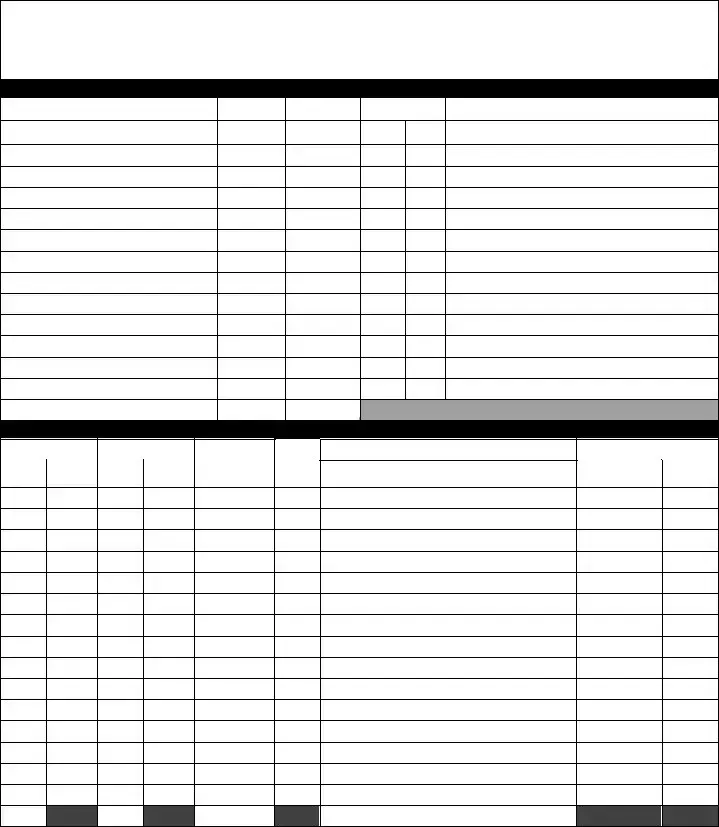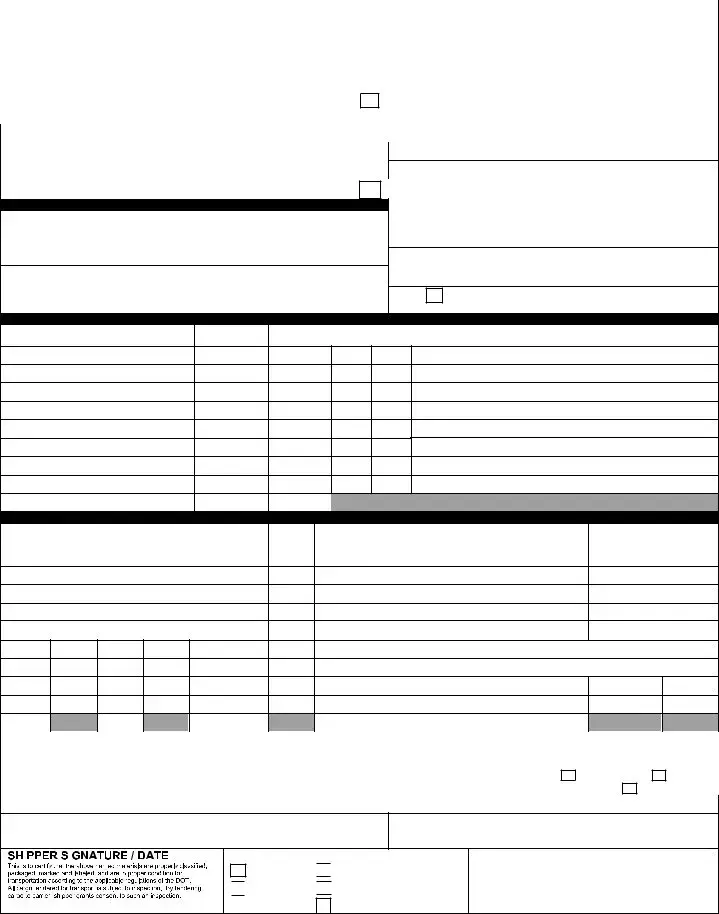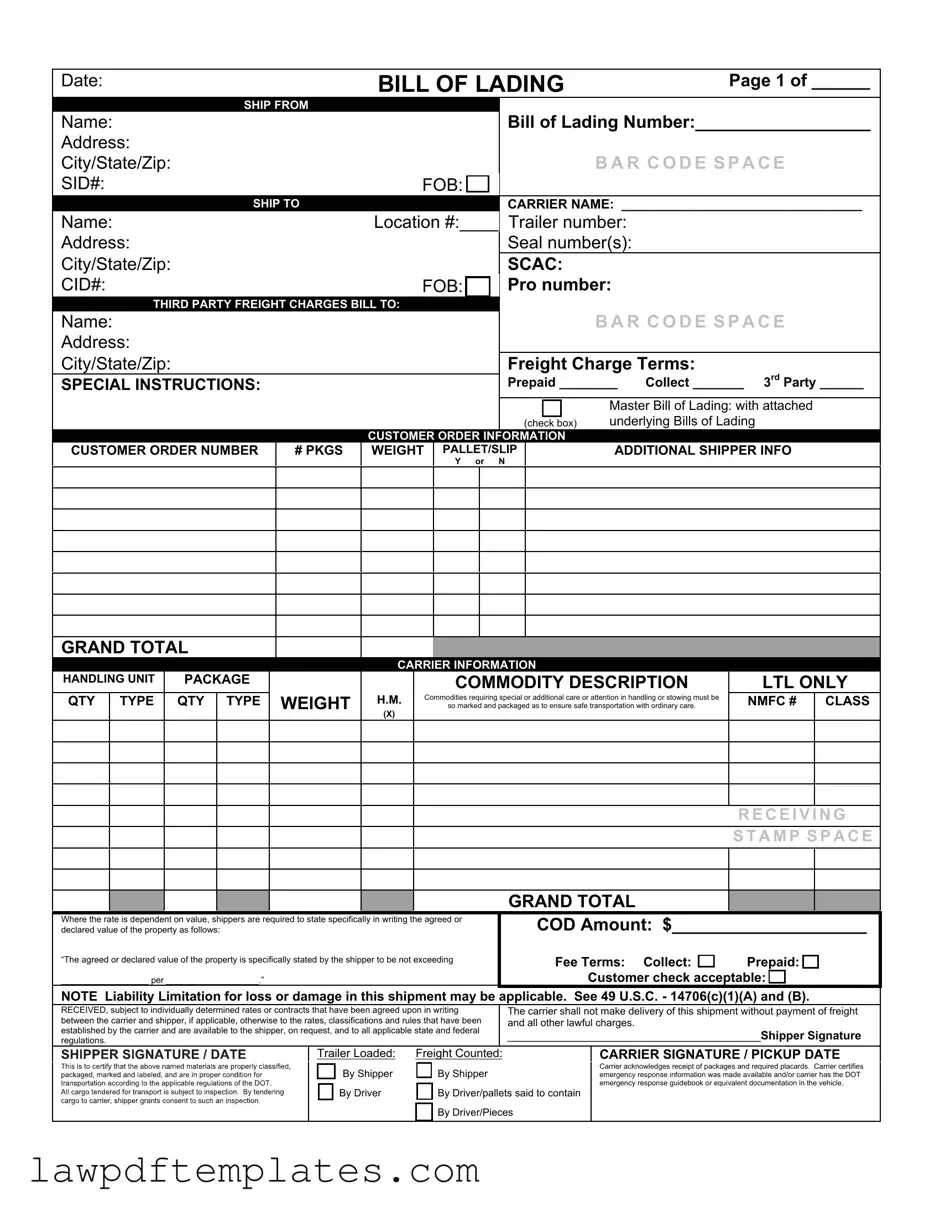Fillable Bill of Lading with a Supplement Template
File Details
| Fact Name | Description |
|---|---|
| Definition | A Bill of Lading is a legal document between a shipper and a carrier that details the type, quantity, and destination of goods being transported. |
| Types | There are several types of Bills of Lading, including straight, order, and bearer forms, each serving different purposes in shipping. |
| Transferability | Some Bills of Lading are negotiable, allowing the transfer of ownership of the goods during transit. |
| Supplement Form | A Supplement form may be used to amend or add additional information to the original Bill of Lading. |
| Governing Law | In the United States, the governing law for Bills of Lading varies by state, often falling under the Uniform Commercial Code (UCC). |
| Liability | The Bill of Lading outlines the liability of the carrier, specifying responsibilities for loss or damage during transport. |
| Importance | This document serves as a receipt for the goods and is essential for claims, insurance, and legal purposes in shipping. |
Sample - Bill of Lading with a Supplement Form

Date: |
BILL OF LADING |
Page 1 of ______ |
|
SHIP FROM |
|
|
|
Name: |
|
Bill of Lading Number:__________________ |
|
Address: |
|
|
|
City/State/Zip: |
|
|
B A R C O D E S P A C E |
SID#: |
FOB: o |
|
|
SHIP TO |
|
CARRIER NAME: _________________________________ |
|
Name: |
Location #:____ |
||||
Address: |
|
|
|
|
|
City/State/Zip: |
|
|
|
|
|
CID#: |
FOB: |
|
o |
|
|
THIRD PARTY FREIGHT CHARGES BILL TO:
Name:
Address:
City/State/Zip:
SPECIAL INSTRUCTIONS:
Trailer number:
Seal number(s):
SCAC:
Pro number:
B A R C O D E S P A C E
Freight Charge Terms:
Prepaid ________ |
Collect _______ 3rd Party ______ |
oMaster Bill of Lading: with attached
(check box) underlying Bills of Lading
CUSTOMER ORDER NUMBER
# PKGS
CUSTOMER ORDER INFORMATION |
|
||
WEIGHT |
PALLET/SLIP |
|
ADDITIONAL SHIPPER INFO |
|
Y OR N |
|
|
GRAND TOTAL
CARRIER INFORMATION
HANDLING UNIT |
PACKAGE |
||
|
|
|
|
QTY |
TYPE |
QTY |
TYPE |
|
|
|
|
WEIGHT
H.M.
(X)
COMMODITY DESCRIPTION
Commodities requiring special or additional care or attention in handling or stowing must be
so marked and packaged as to ensure safe transportation with ordinary care.
LTL ONLY
NMFC # |
CLASS |
|
|
R E C E I V I N G
S T A M P S P A C E
GRAND TOTAL
Where the rate is dependent on value, shippers are required to state specifically in writing the agreed or |
COD Amount: $____________________ |
|
declared value of the property as follows: |
||
“The agreed or declared value of the property is specifically stated by the shipper to be not exceeding |
Fee Terms: Collect: ¨ |
Prepaid: o |
__________________ per ___________________.” |
Customer check acceptable: o |
|
NOTE Liability Limitation for loss or damage in this shipment may be applicable. See 49 U.S.C. - 14706(c)(1)(A) and (B).
RECEIVED, subject to individually determined rates or contracts that have been agreed upon in writing between the carrier and shipper, if applicable, otherwise to the rates, classifications and rules that have been established by the carrier and are available to the shipper, on request, and to all applicable state and federal regulations.
The carrier shall not make delivery of this shipment without payment of freight and all other lawful charges.
_______________________________________Shipper Signature
SHIPPER SIGNATURE / DATE
This is to certify that the above named materials are properly classified, packaged, marked and labeled, and are in
to certify that the above named materials are properly classified, packaged, marked and labeled, and are in proper condition for transportation according to the applicable regulations of the DOT.
proper condition for transportation according to the applicable regulations of the DOT.
Trailer Loaded: Freight Counted:
p By Shipper p
 By Shipper
By Shipper
p
 By Driver p
By Driver p
 By Driver/pallets said to contain
By Driver/pallets said to contain
pBy Driver/Pieces
CARRIER SIGNATURE / PICKUP DATE
Carrier acknowledges receipt of packages and required placards. Carrier certifies emergency response information was made available and/or carrier has the DOT emergency response guidebook or equivalent documentation in the vehicle.

SUPPLEMENT TO THE BILL OF LADING Page _________
Bill of Lading Number: __________________
CUSTOMER ORDER INFORMATION
CUSTOMER ORDER NUMBER # PKGS WEIGHT
PALLET/SLIP
Y OR N
ADDITIONAL SHIPPER INFO
PAGE SUBTOTAL
CARRIER INFORMATION
HANDLING UNIT |
PACKAGE |
|
|
QTY TYPE |
QTY TYPE |
WEIGHT
H.M.
(X)
COMMODITY DESCRIPTION
Commodities requiring special or additional care or attention in handling or stowing must be so marked and packaged as to ensure safe transportation with ordinary care.
LTL ONLY
NMFC # |
CLASS |
PAGE SUBTOTAL
Common mistakes
Filling out a Bill of Lading with a Supplement form can be straightforward, but many people make common mistakes that can lead to delays or issues in shipping. One frequent error is not providing complete and accurate information about the shipment. Missing details, such as the shipper's address or the consignee's contact information, can create confusion and result in delivery problems.
Another mistake is failing to accurately describe the goods being shipped. This includes not specifying the correct weight, dimensions, or nature of the items. Inaccurate descriptions can lead to misclassification, which may affect shipping costs and insurance coverage.
People often overlook the importance of checking the terms and conditions. Not understanding the agreed-upon terms can lead to disputes later on. It’s essential to read through the fine print and ensure that all parties are on the same page regarding responsibilities and liabilities.
Additionally, some individuals forget to sign the document. A Bill of Lading without a signature is not valid. This simple oversight can cause significant delays in the shipping process, as carriers require a signed document to proceed.
Another common error is neglecting to keep copies of the completed forms. Failing to retain a copy can create problems if there are questions or disputes about the shipment later. Always make sure to have a record for your files.
Using outdated forms can also be an issue. Regulations and requirements may change, so it’s crucial to ensure that the form being used is the most current version. Using an old form can lead to compliance issues and potential fines.
Lastly, many people rush through the process, leading to careless mistakes. Taking the time to double-check all entries can save time and hassle down the line. A thorough review can catch errors before they become bigger problems.
Common PDF Documents
Shared Well Agreement - Water quality analysis is referenced, ensuring the supply meets health safety standards.
In order to facilitate the smooth delivery of packages, the FedEx Release Form should be filled out with care; to assist with this process, many find the resources available at Fast PDF Templates beneficial for obtaining the necessary documentation.
Texas Temporary Tag - This form is used for issuing temporary vehicle tags in Texas.
Flying Internationally With Dog - Ensure all information is accurate to avoid potential travel issues.
